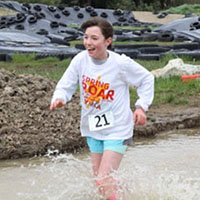— by Gray Gailey (6th grader) —
[metaslider id=51992]
This year, on Apr. 23, Camp Orkila hosted their first annual ROAR, or Rogue Obstacle Adventure Race, on a windy, rainy afternoon. Before the race began, a Camp Orkila counselor spoke to the excited crowd of participants, ages ranging from five to 50, and explained that ROAR was a “choose your challenge” course, and that there were to be three waves of participants.
The first wave was for those who wanted to actually race and compete against others; the second wave was for people who did not want to race, yet still wanted to run fast; and the last wave was for those who didn’t want to race, and only wanted to experience the adventure at their own pace.
After briefly explaining the path and the obstacles that the runners were about to face, he directed all participants to a large banner that read, “START.” All the runners lined up underneath the banner and waited to begin as uplifting and energetic music played in the background.
After a few minutes of anxious waiting, a counselor shouted that the first wave could start running, and so they did. Once they had turned the first corner, the second wave took off, leaving no one in the third wave—apparently all in attendance wanted to race after all.
The 1.5 mile course included a cargo net crawl, a haystack, logs that participants had to roll under, and, of course, lots and lots of running, all while escaping camp counselors wielding spray bottles full of colored powder aimed at them.
Though these obstacles were fun and challenging, the most memorable part of ROAR for many participants was most likely the mud pit located before the finish line. When the runners arrived at the mud pit, most of them were covered with green powder and dirt. Many were reluctant to walk into the mud and tried to see if they could walk around it, while others just jumped right in and enjoyed the shocking coolness of the muddy water.
The pit was a long strip of water with almost knee-deep mud resting on the bottom. At the end of the pit, there were two ropes which runners used to hoist themselves out of the muddy water and onto dry land, where they were greeted by camp counselors, who heaved colorful dodge balls at them. But the obstacle course wasn’t over just yet—as runners approached the finish line, they were sprayed with some celebratory pink powder.
Camp Director, Dimitri Stankevich, who has been with Camp Orkila since 2005, was thrilled with the community turnout, cheering on the fifty-plus contestants, and plans to make ROAR an annual spring event. For more information about Camp Orkila, visit www.seattleymca.org/camps/orkila
**If you are reading theOrcasonian for free, thank your fellow islanders. If you would like to support theOrcasonian CLICK HERE to set your modestly-priced, voluntary subscription. Otherwise, no worries; we’re happy to share with you.**








